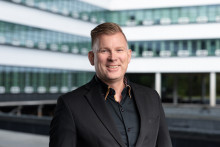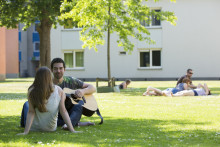According to a prominent expert in the international labor market, Nannette Ripmeester, the German organizational culture is characterized by hierarchy. The top management takes great responsibility and there is almost a universal respect for authority. This means greater degree of formality than, for example, in the Netherlands. Here, it is not uncommon to walk unannounced into one's boss's office and, addressing that boss by his or her first name, utter some direct (but, of course, not seething) criticism when one does not agree with something that was said or done. Whereas in Germany, one would not even think about just walking into a boss's office, let alone criticize him or her. Atop this, the use of first names is, in many cases, considered highly inappropriate, even among direct colleagues.
It may be worthwhile to insert a word of advice to those who wish to travel in Germany. While the German people are willing to help and most young people speak reasonable English or, in a few cases, French, it may not be as easy as getting around in the Netherlands. It is not uncommon to find oneself in a situation in which the people speak only German. So, a quick audio course to know how to find one's way around or how to order a mug of beer, might be of help before embarking upon a trip to Germany, especially rural Germany. In major cities, one can almost always bump into someone who understands the major European languages. One more useful tip, especially for Asian people: In many Asian countries, people are used to saying `No thanks' when first offered food or drink by the host, as a mark of respect or courtesy. Only on being asked two or more times do they normally accept such offerings. Do NOT try this in Germany! A typical German host will ask only once. Saying `No' in Germany means `No.' There will be no second chance to accept an offer for food or drink. Just say `Yes' the first time; this is not impolite.
Finally, from an interview on the BBC program `Top Gear,' Omid Djalili, an Iranian comedian living in Great Britain, claims to be the only Iranian comedian in Britain. When confronted by the interviewer to substantiate his statement, he replied: `Actually, I was calling myself the only Iranian comedian in the world, which is incidentally, three more than Germany. I told this in Germany and it didn't go down very well with the Germans. They kept saying, `That's not a joke. You are one, which means we are in deficit of minus two. Now, let's take the pie-chart and discuss this…'
Though this was originally intended to make fun of the presumed lack of sense of humor of the Germans, it also reflects a positive side about them: `Gruendlichkeit' (literally, `thoroughness') they execute things thoroughly and methodically, the results of which are there to see.
The writer is from Chennai, India (PhD candidate, Production Technology /CTW) and arrived in January at the UT, after earning a master's degree from RWTH in Aachen, Germany
New series: know your world
The motivation behind this new series is to increase the awareness among the students and staff members of UT, with respect to cultures that are alien to them. Each article of this series will aim at presenting the essence of the custom, traditions, beliefs and facts concerning a foreign country, to enable the enhancement of the already prevalent harmonious concatenation of people from varied backgrounds at the UT. An attempt will also be made to point out certain behavioral aspects, which, while perfectly normal to citizens of that country, may seem odd to non-natives.

Symbol of German culture: Brandenburg Gate in Berlin







